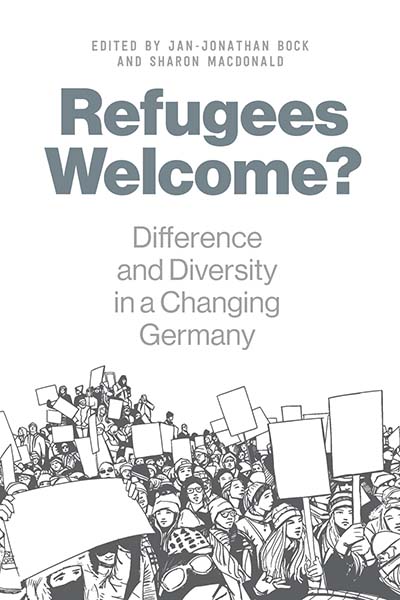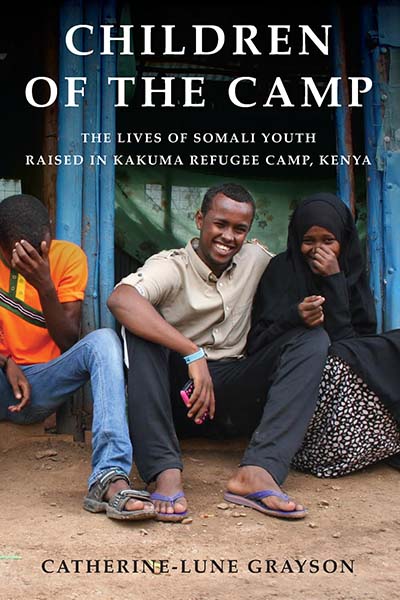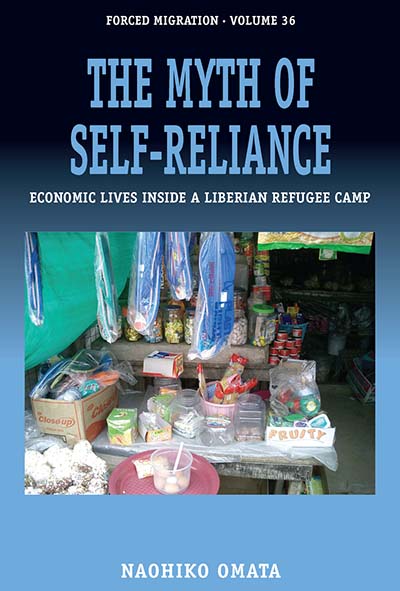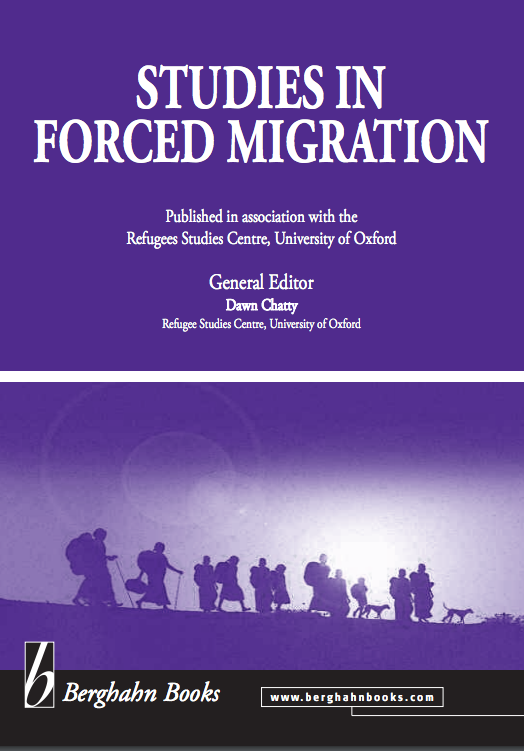Ambika Natarajan discusses her new book, Servants of Culture: Paternalism, Policing, and Identity Politics in Vienna, 1700-1914, which provides an account of Habsburg servant law since the eighteenth century and uncovers the paternalistic and maternalistic assumptions and anxieties which turned the interest of socio-political players in improving poor living and working conditions into practices that created restrictive gender and class hierarchies.
Tag: refugee studies
Celebrating Anthropology Day with Open Access from Berghahn Books
Berghahn Books supports practical open access policies that help make scholarship available to a broader audience in a sustainable way.
In addition to offering gold open access options that uphold publication mandates instituted by our authors’ funding partners, we also participate in initiatives, such as Knowledge Unlatched, which provide collective funding opportunities for selected titles. To find out more visit our website.
To celebrate Anthropology Day (Feb 17th), we are pleased to present a selection of our new and recent Open Access Anthropology titles.
Continue reading “Celebrating Anthropology Day with Open Access from Berghahn Books”A Refugee Pastor in a Refugee Church
Karen Lauterbach

World Refugee Day (20 June) offers a chance to raise awareness of the plight of refugees around the world and of the efforts to protect their human rights. In the spirit of this day, we are featuring an excerpt from “‘A Refugee Pastor in a Refugee Church’: Refugee-Refugee Hosting in a Faith-Based Context” by Karen Lauterbach (published in Migration and Society, Vol 4: Issue 1).
WORLD REFUGEE DAY
The United Nations’ (UN) World Refugee Day is observed on June 20 each year. This event draws public’s attention to the millions of refugees and internally displaced persons worldwide who have been forced to flee their homes due to war, conflict and persecution. For more information please visit www.un.org.
This year Berghahn Books turns 25! To mark this important milestone, we are offering 25% off all books. For print titles, please add the coupon code BB25. For eBooks, the discount is automatic.
In addition, Berghahn Journals is offering FULL ACCESS to related articles until June 28. Scroll down for details.
 REFUGEES WELCOME?
REFUGEES WELCOME?
Difference and Diversity in a Changing Germany
Edited by Jan-Jonathan Bock and Sharon Macdonald
WORLD ANTHROPOLOGY DAY 2019
The 2019 Anthropology Day celebration is on Thursday, February 21st. According to the AAA website, Anthropology Day “is a day for anthropologists to celebrate our discipline while sharing it with the world around us.”
To join the celebration, we are delighted to showcase titles from across all strands of the subject and offer a limited time 25% discount on ALL Anthropology print titles ordered via our website, valid through February 28th, 2019. Simply enter the code WAD19 at checkout.
Featured below is just a selection of our newly published title, for a full listing of all anthropology titles, please visit our webpage.
We are also pleased to announce an expanding list of eBooks available for download directly via our site. Visit our Anthropology eBooks site.
World Refugee Day 2018
The United Nations’ (UN) World Refugee Day is observed on June 20 each year. This event draws public’s attention to the millions of refugees and internally displaced persons worldwide who have been forced to flee their homes due to war, conflict and persecution. For more information please visit www.un.org.
In marking this year’s observance, we’re pleased to offer a 25% discount on all Refugee and Migration Studies titles for a limited time with code WRD18 on our website.
 CHILDREN OF THE CAMP
CHILDREN OF THE CAMP
The Lives of Somali Youth Raised in Kakuma Refugee Camp, Kenya
Catherine-Lune Grayson
International Migrants Day
On December 18, the international community recognizes the rights of migrants around the world. Each year the UN invites governments, organizations, and individuals to distribute information on the human rights and migrants’ fundamental freedoms.This is the day to express our support and solidarity with all immigrants. For more information please visit http://www.un.org/en/events/migrantsday/index.shtml
With this in mind, we present below a selection of related titles, and a 25% discount on all of our Refugee and Migration Studies books for the next 30 days. At checkout, simply enter the code IMG17. For a full range of our titles, please visit our website.
Also, please scroll down to view and access a list of Related Articles from Berghahn Journals, until Dec 31!
 CHILDREN OF THE CAMP
CHILDREN OF THE CAMP
The Lives of Somali Youth Raised in Kakuma Refugee Camp, Kenya
Catherine-Lune Grayson
Promoting ‘self-reliance’ for refugees: what does it really mean?
The following is a post by Naohiko Omata, author of The Myth of Self-Reliance: Economic Lives Inside a Liberian Refugee Camp.
Promotion of ‘self-reliance’ for refugees has occupied a central seat in the policy arena of the international refugee regime in recent years. The United Nations High Commissioner for Refugees (UNHCR) broadly defines self-reliance as ‘the social and economic ability of an individual, a household or a community to meet essential needs in a sustainable manner’. Its guiding philosophy can be summarised as: refugees have the skills, capacity and agency to stand on their own and be able to sustain themselves without depending on external humanitarian aid. This concept has been universally embraced by policy-makers and aid agencies and has now become an increasingly visible part in refugee assistance and protection programmes worldwide.
But on the ground, what does it really mean for refugees to attain self-reliance?
While many policies have rhetorically committed to the importance of ‘helping refugees help themselves’, some fundamental questions remain unanswered.
First, do refugees have enabling conditions to achieve self-reliance? Currently, many refugees in the Global South are unable to fully exercise their right to work and to move freely due to regulations by their host governments. These impediments can severely constrain refugees’ capacity to construct meaningful livelihoods and limit their access to commercial markets. Under these restrictions, is it sensible to assume that refugees can attain self-reliance regardless of how industrious and ingenious they are?
Next, how do we determine whether refugees have achieved self-reliance? Despite its extensive promotion, there are to date no universally agreed systematic and rigorous criteria for measuring refugees’ self-reliance. Instead of using objective benchmarks, UNHCR often perceives refugees as self-reliant when they live without external assistance. Is the situation in which refugees living without aid a plausible indicator of ‘meeting their basic needs in a sustainable manner’, as defined by UNHCR?
Most importantly, for whom is refugees’ self-reliance being promoted? In theory, nurturing refugees’ self-reliance should entail a strategic shift from traditional relief aid to development-oriented support and the provision of enabling conditions for refugees to establish gainful livelihoods. Yet this is not happening in the field. Meanwhile, UNHCR and donor states usually start decreasing assistance for refugees while promoting refugees’ self-reliance. Is refugees’ self-reliance meant to empower refugees’ economic capacities or to justify cutting down aid for refugee populations?
My authored book, The Myth of Self-Reliance, has explored these important but unsolved questions through a study of Buduburam refugee camp in Ghana. This Liberian refugee camp has been commended by UNHCR as an exemplary ‘self-reliant’ model in which refugees were sustaining themselves through robust businesses with little donor support. The UN refugee agency even boasted that the organization had facilitated their economic success by gradually withdrawing its assistance over the period of exile.
The book challenges the reputation of Buduburam refugee camp as a successful model for self-reliance and sheds light on considerable economic inequality between refugee households. Both qualitative and quantitative data reveal that a key livelihood resource for refugees in Buduburam was not their commercial activities but their access to overseas remittances, which had nothing to do with UNHCR’s initiatives to foster refugees’ self-reliance by withdrawing aid. While refugees who were receiving remittances were able to satisfy their basic day-to-day needs, those who had no connections to the diaspora were deeply impoverished.
There is increasing support for the idea that refugees are active and capable players with ingenuity and resilience. I agree wholeheartedly with this view in principle. However, it is irresponsible to assume that this can entirely replace the need for humanitarian aid and protection, in the absence of an enabling environment and adequate resources. Over-emphasis on the resilience, agency and capacity of refugees can obscure internal differentiations in their economic capacities, and universal celebration of refugees’ self-reliance can even undermine refugee protection and welfare. While we should certainly acknowledge and respect refugees’ capabilities and resourcefulness in the face of adversity, we should not dump all responsibilities on the shoulders of refugees alone.
Given the daunting scale of refugees globally, it is undeniable that we need to pioneer new ways to support and enable their socio-economic independence in the long-term. However, making refugee self-reliance a reality necessitates a strong commitment and investment from not only refugee but host governments, the donor community, development agencies, UNHCR, and other relief organizations.
Learn more about The Myth of Self-Reliance: Economic Lives Inside a Liberian Refugee Camp here and read the Introduction for free online.
World Refugee Day
The United Nations’ (UN) World Refugee Day is observed on June 20 each year. This event draws public’s attention to the millions of refugees and internally displaced persons worldwide who have been forced to flee their homes due to war, conflict and persecution.
“Refugees are people like anyone else, like you and me. They led ordinary lives before becoming displaced, and their biggest dream is to be able to live normally again. On this World Refugee Day, let us recall our common humanity, celebrate tolerance and diversity and open our hearts to refugees everywhere.” – Ban Ki-moon
Berghahn Books at the ISA 2016 Conference!

We are delighted to inform you that we will be present at International Studies Association’s 57th Annual Conference in Atlanta, GA, March 16th – 19th, 2016. Please stop by the Book Exhibit Hall and visit our booth #622 to browse the latest selection of books at discounted prices & pick up some free journal samples.
If you are unable to attend, we would like to provide you with a special discount offer. For the next 30 days, receive a 25% discount on all Politics & International Relations titles found on our website. At checkout, simply enter the discount code ISA16. Browse our newly published interactive online Politics & International Relations Catalog 2016 or use the new enhanced subject searching features for a complete listing of all published and forthcoming titles.
Here is a preview of some of our newest releases on display. Continue reading “Berghahn Books at the ISA 2016 Conference!”





